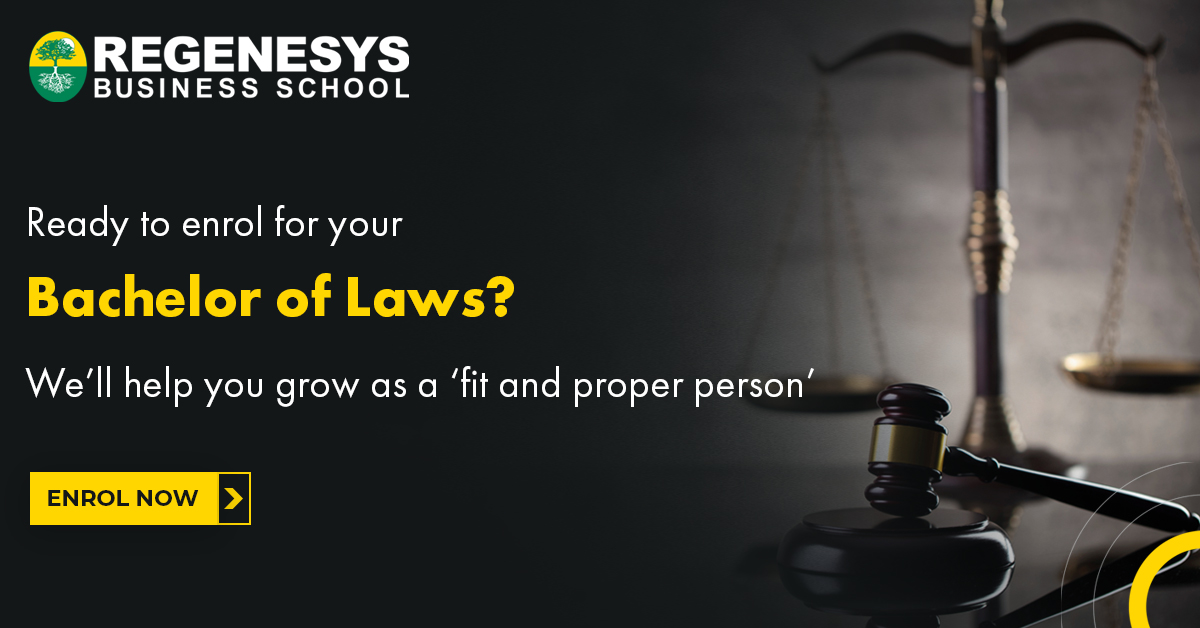Your Bachelor of Laws (LLB degree) is a major part of your journey to becoming a lawyer, but that’s not all there is to it.
IN THIS ARTICLE:
- What your coursework must cover
- With whom to do articles after your law degree
- With whom to serve pupillage after your LLB degree
- Additional requirements for legal practitioners
- Post Bachelor of Laws requirements in a nutshell
- What you can do with your LLB degree
To become a lawyer you must complete a four-year LLB degree, and complete all legally prescribed practical vocational training requirements as a candidate legal practitioner, including:
- Community service;
- 12 to 24 months of practical vocational training, depending on whether you want to be an attorney or an advocate;
- A legal practice management course plus additional coursework; and
- Be admitted by the High Court (licensed to practice) as an attorney or advocate.
What your coursework must cover
In terms of Section 109(1)(a) of the Legal Practice Act, gazetted on 31 August 2018, your coursework must cover:
- Constitutional practice;
- Professional legal ethics;
- Personal injury claims;
- High court practice;
- Magistrate’s court practice;
- Criminal court practice;
- Labour dispute resolution;
- Alternative dispute resolution
- Attorneys’ bookkeeping;
- Wills and estates;
- Matrimonial law;
- Legal costs;
- Drafting contracts;
- Information and communication technology for your practice, and associated aspects of cyber law; and
- Introduction to practice management.
(Law Society of South Africa, 2022)
With whom to do articles after your law degree
You need to find a legal practitioner or firm to take you on as a candidate attorney to serve your articles. The act notes that post-law degree candidate attorneys “may be engaged or retained under a practical vocational training contract by an attorney:
6 (1) (a) “Practising for his or her own account;
(b) “Practising as a partner in a firm of attorneys;
(c) “Practising as a member of a juristic entity;
(d) “Practising as state attorney;
(e) “Who has practised as a professional assistant in a firm of attorneys for a period of five years within the preceding six years; or
(f) “In the full time employ of, or who is a member of –
(i) “Legal Aid South Africa, established in terms of the Legal Aid South Africa Act, 2014 (Act No. 39 of 2014); or
(ii) “A legal aid institution which has been approved by the (provincial law) Council for the purpose of engaging candidate attorneys and who is responsible for supervising the training of candidate attorneys so engaged; or
(iii) “Any other institution approved by the (provincial law) Council for the purpose of engaging candidate attorneys and who is responsible for supervising the training of candidate attorneys so engaged.”
(Government Gazette, 2018).
With whom to serve pupillage after your LLB degree
However, if you seek admission as an advocate after completing your LLB degree, the regulations require you to:
7 (1) (a) “Serve under a practical vocational training contract with a person referred to in subregulation (4)* for an uninterrupted period of 12 months after that person has satisfied all the requirements for a degree referred to in sections 26(1)(a) or (b) of
the act; and
(b) “Prior to or during service under a practical vocational training contract complete a programme of structured course work, comprising compulsory modules, of not less than 400 notional hours duration in the aggregate over a period of no longer than six months.(2) Attendance at any training course approved by any existing society of advocates, the National Bar Council of South Africa or the General Council of the Bar for which the pupil registered before the date referred to in section 120(4) of the Act and in respect of which the required attendance was completed within a period of 12 months after that date is regarded for purposes of these regulations as compliance with the requirements of subregulation (1)(b).
(3) Subject to the provisions of the act, any period of service before the pupil has satisfied the requirements of the degrees referred to in subregulation (1) is not regarded as good or sufficient service in terms of a practical vocational training contract.”
(Government Gazette, 2018).
Additional requirements for legal practitioners
Then, no matter whether you apply to the High Court to be admitted as an attorney or advocate, you will also need a referee who can attest that you are of good character and good moral standing.
If you intend to become a conveyancer or notary, you will also be required to pass additional competency-based examinations.

Post-Bachelor of Laws requirements in a nutshell
In summary, to be admitted to practice as an attorney – an officer of the court – in South Africa you must:
- Be 21 or older;
- A South African citizen or permanent resident;
- Hold a four-year Bachelor of Laws degree (or, if qualified in another country, hold five-year equivalent law degree recognised by the South African Qualifications Authority);
- Have completed practical vocational training requirements as a candidate legal practitioner, serving 24 months as an articled clerk or in a law clinic community service contract, or 12 months in pupillage;
- Have completed a practice management course; and thereafter
- Pass the Legal Practice Council attorney’s admission examination; and
- Be regarded by the Law Society and the High Court as a “fit and proper person” – an honest person of proven integrity.
(Law Society of South Africa, 2016).
What you can do with your LLB degree
Once admitted, you may practice as a lawyer, representing clients in court, preparing legal documents, providing legal advice, negotiating legally binding and enforceable contracts, and other related tasks.
Your LLB degree will give you a strong foundation in legal theory and practice, usually covering civil law, criminal law, corporate law, family law, immigration law, and international law, and accounting for legal practice, among other things.
Should you decide not to practice as a lawyer, you will find your legal studies provide a good grounding in business, as you will have learnt to think critically, analyse complex problems, and communicate effectively – all essential skills for a business professional.
* Someone who has practised as an advocate for at least three of the four preceding years, or who practised as an advocate for the equivalent period prior to joining Legal Aid South Africa or another institution.
(Government Gazette, 2018).
References
- Law Society of South Africa. (2016). Career Guide to the Legal Profession.
- Law Society of South Africa. (2022). Becoming a legal practitioner.
- Government Gazette. (2018). Legal Practice Act, 2014: Regulations under Section 109(1)(a)
- Are you a lawyer after an LLB? - January 6, 2023
- What Can I Do With a Law Degree in South Africa? - November 25, 2022


